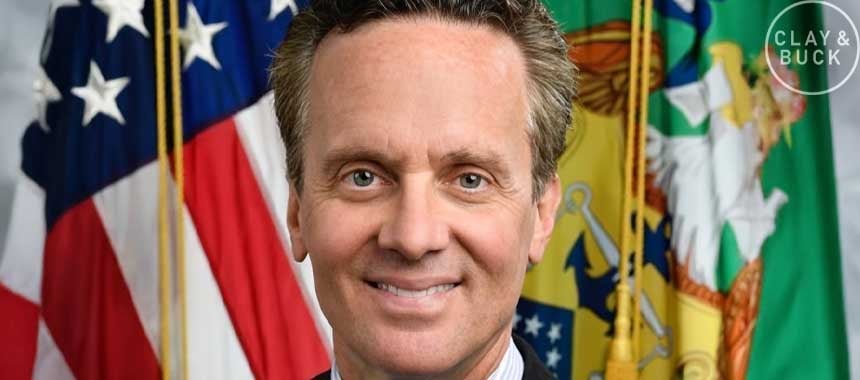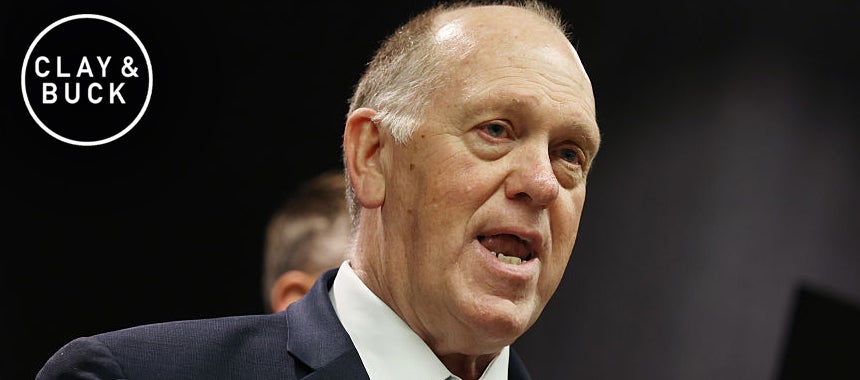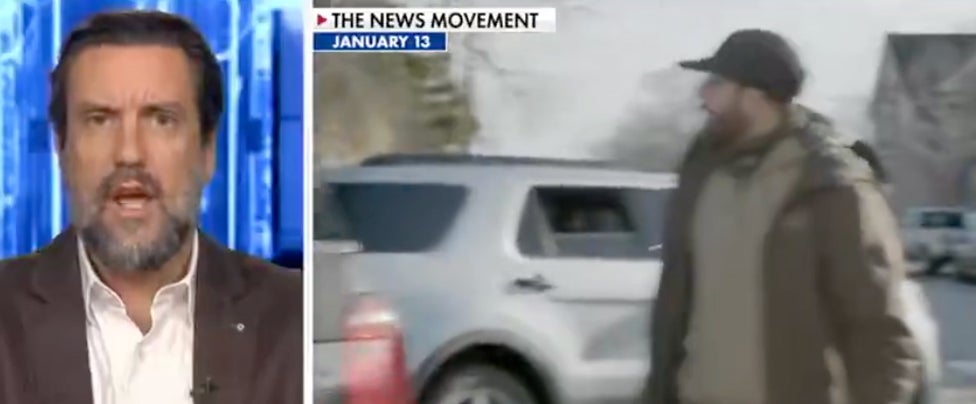Could Pursuing War Crimes Deter Putin and His Cronies?
3 Mar 2022
CLAY: I had an interesting conversation yesterday. My wife is in law school. She is finishing her law degree and one of her professors is at Vanderbilt University, Vanderbilt University Law School, which is also where I went. He has done an interesting study. He did a lot of work in international affairs back when he was in the military, and he’s done a lot of work with war crimes. He’s named Michael Newton.
He’s on the faculty at Vanderbilt, and she brought me an editorial that he has written arguing that what the United States should do from now is — obviously, we’re not gonna commit resources in terms of putting actual soldiers on the ground. And it’s not smart to get involved, I don’t believe, in this idea of whether or not you’re patrolling the skies, whether you’re gonna try to restrict the flow of Russian air superiority.
What he says is something where I think the conversation is going to get evolved, and that is Vladimir Putin is clearly, in this expert on international war crimes — again, Michael Newton and there are many other people making the argument alongside of him — that this is clearly war crimes. And what the United States should do is Joe Biden should allow all of the people who are international war crimes experts to officially begin war crime investigations.
Now, I want to play you this audio ’cause I think it’s a really interesting argument that the best way that America could put more pressure onto Vladimir Putin now is by investigating war crimes because it seems quite clear that those are going on. Now, Joe Biden was actually asked about this yesterday, and I want to play cut 2 because he won’t say right now Putin is committing war crimes, even though it seems quite clear he is. Listen to this.
 REPORTER: Russia is committing war crimes in Ukraine.
REPORTER: Russia is committing war crimes in Ukraine.
BIDEN: We’re following it very closely. It’s too early to say that.
CLAY: “Too early to say that.” Well, President Zelensky says this is clearly genocide. He’s on the ground right there in Ukraine. Play cut 3. Listen to this.
ZELENSKY: (via translator) This is genocide and Nazism, and I am ashamed that we are in the twenty-first century, in 2022, and we are seeing acts where people are told, “Forget dire predictions of the end of the world. This is the end of the world.” If there are such actions, this world is at an end for people like that. The issue is that we are the border, the fence between them and civilization.
CLAY: All right. And then in America there are some politicians who are now picking up this argument, including Ukrainian-born congresswoman from Indiana, Victoria Spartz, who says this is genocide, this is clearly a war crime. Listen to what she said.
VOICE: This question and how it should be answered about Vladimir Putin and whether he’s a war criminal.
SPARTZ: Hopefully, you know, we can have more pressure so things happen because people need to have, you know, some stability for the genocide, for killing people, for war crimes. It’s not a war. It’s killing, extermination of people.
CLAY: All right. Your thoughts on this argument, Buck.
BUCK: First of all, Russia is no longer a signatory to the International Criminal Court. They pulled out in 2016 after the annexation of Crimea. Now, does that really matter? No, because you can still bring charges technically in the International Criminal Court against somebody for war crimes even if they’re not a signatory, but it does complicate matters a little bit. You’d also have to have a state willing to arrest Vladimir Putin, and Putin is not leaving.
Putin is not touching down anywhere, anytime soon where you have anybody willing to recognize that jurisdiction. You would have Vladimir Putin also arguing that coalition, U.S. actions… I’m saying what he would argue. I’m not saying it’s true. But he would argue the coalition U.S. actions in Iraq and Afghanistan in different contexts also would constitute war crimes, right?
So it’s not gonna stop the conflict now. This is more of a when the conflict is no longer ongoing, would you have a conversation about this? There’s no way you’re gonna be able to get Vladimir Putin when he still wants to have the Russian war machine engaged in this invasion of Ukraine, no one’s taking him down with a legal challenge, right? So.
CLAY: Do you think it makes people around him nervous? ‘Cause Putin may feel like, “I’m protected. I’m above the law.” I think it’s quite clear that Putin himself would say that. The argument I think that is interesting is, are there people that don’t have Putin’s protections that are also closely allied enough with the decisions that are being made in Russia that it might give them pause and/or make them nervous and start to unwind a bit the legitimacy of Putin’s range?
 BUCK: Yes, but you also have to remember that even billionaire oligarchs in Putin’s orbit will be fed to the tigers sometimes. I mean, he doesn’t really care, right? So if you’re not getting at Putin, who can you get around him that would actually put enough pressure on him to make him changing his decision-making here? And also, I think U.S. perception of who and to what degree of support — or who supports Putin and to what degree inside of Russia.
BUCK: Yes, but you also have to remember that even billionaire oligarchs in Putin’s orbit will be fed to the tigers sometimes. I mean, he doesn’t really care, right? So if you’re not getting at Putin, who can you get around him that would actually put enough pressure on him to make him changing his decision-making here? And also, I think U.S. perception of who and to what degree of support — or who supports Putin and to what degree inside of Russia.
We just don’t really know. We just don’t really have a good sense of that. I mean, the intelligence community, journalism, people that are looking at this issue I think are having to engage in a lot of guesswork over who would actually get this guy to stop what he’s doing right now. And I think there’s a greater recognition today certainly as you have the loss of the first city, although there’s some debate, there’s some conflicting reports.
But you have Kherson on the Black Sea, which has fallen, Mariupol, which is on the Sea of Azov; so these are the southern part of Ukraine that is looking like it’s about to fall. You’ve got Kharkiv still getting shelled. You’ve got Kiev, the capital, on the way to getting encircled. The Russian war machine is showing no signs of slowing down. And just because they didn’t get a blitzkrieg or a lightning-fast victory. If you think about it in chess there are some moves you can make that will end the chess match…
I forget, there’s terms for all this. But in less than five or — let me be more specific — 10 moves, you can actually end a chess match. Putin may have tried that but that doesn’t mean that he’s not gonna keep going even if that initial salvo, so to speak, failed. So I think that this is going to get… Clay, it’s gonna get a lot worse. I think that we’re very few from seeing Russia feel like and Putin feel like there’s in touch pressure being brought against him that he would change this.
Once he realities the reality… One of the problems we have here is you can’t North Korea-ize Russia. Never gonna happen, right? So you have a lot of people with tremendous influence and assets globally in Russia, talking about the oligarchs, who, when this is done, when the ceasefire happens or whenever this conflict comes to a terminus — and hopefully it’s days, I think it will be months, but whenever this actually happens — you’re gonna have to deal with bringing Russia back into the fold.
There is no future which — and Putin knows that. He knows people want the gas to flow. He knows there’s a lot of ways to continue on with this. So that makes everything more challenging. All the pressure we bring to bear, Clay, feels, I think, from the Russian perspective, Putin perspective as though it’s temporary, and it’s a set up that way.
CLAY: I think it’s an interesting question, how long are Americans gonna care? And that may be the balancing act that Vladimir Putin in his mind is trying to consider, right? It’s very easy to be pro-Zelensky and pro-Ukraine when the story is fresh and it’s new and we’re the first seven days, first 10 days in. But to your point if this drags into, let’s say, it’s June. Let’s say it’s July. Is American news still going to be leading with the latest news from Ukraine?
Because I think it’s an interesting dynamic because the longer Ukraine holds on, the more it challenges Putin but also the more difficult it becomes, I think, for American interests to remain. Does that make sense? How long is the lead story in every newscast going to be the minute-by-minute updates of what’s going on in Ukraine?
 BUCK: There were over a half a million people — and I should see what the most recent estimates are — who died in the Syrian civil war. That went on for years. There was no U.S. military engagement on the ground. Obviously, no nuclear powers involved there. Well, I shouldn’t say that. Russia became involved, but I mean the warring factions inside of Syria were on a very different scale than the Russian war machine. By the way, that was another place where Russia essentially got its way through the application of force.
BUCK: There were over a half a million people — and I should see what the most recent estimates are — who died in the Syrian civil war. That went on for years. There was no U.S. military engagement on the ground. Obviously, no nuclear powers involved there. Well, I shouldn’t say that. Russia became involved, but I mean the warring factions inside of Syria were on a very different scale than the Russian war machine. By the way, that was another place where Russia essentially got its way through the application of force.
You see the last 10 years or so in Georgia, Russia got what it wanted. Crimea and eastern Ukraine, got what it wanted. Syria propped up the Assad regime, got what it wanted. A lot of help from the Iranians, too. So there hasn’t actually been a real slapdown, if you will, of Russia’s imperial ambitions. If anything, it’s been really building to this point. I think people have been ignoring it.
So will Americans continue to care? Yeah, I mean, it’s… I keep telling everybody this because I just think you need to go psychologically be prepared for this, Clay, everyone needs to be prepared for this to get a whole lot more horrific and ugly ’cause that’s the trajectory of these conflicts when they go on like this. The first week is never the worst week.
CLAY: And extend for months, potentially, in terms of the way that you’re balancing out. I think there’s this idea among many people who are following this story that on any given day there may be a resolution to this story, and that’s unlikely. This is much more likely to be a marathon than it is a sprint the way that it’s being set out right now.
BUCK: There’s also a cognitive dissonance. We were talking to Larry Kudlow about this before, and they haven’t put on the full scope of sanctions on the energy market because it would be too economically painful. So on the one hand you have a lot of people going on TV, you have the analyst class, you have Democrats and a lot of Republicans who are essentially saying, “We will do anything to stand for democracy in Ukraine,” not troops, but also not to make energy too expensive.
You can see there is a price that has already been put on this. I agree with the red line about troops and about us fighting the Russians. It is interesting, though, that the people that are the loudest sort of chest thumpers, if you will, about how “our principles are at risk in Ukraine,” unless the oil prices get too high, in which case let’s not —
CLAY: That’s right.
BUCK: That is reality, folks. That is going on right now. So I think everyone needs to remember that as we continue to follow this.
Recent Stories

Peter Schweizer: Democrats Colluded with Foreign Powers to Use Immigration as a Weapon
The bestselling author has a new #1 book: The Invisible Coup: How American Elites and Foreign Powers Use Immigration as a Weapon.

VIP Video: Echoes of the Duke Lacrosse Tragedy
C&B reach back in time for a lesson that still applies.

Joe Lavorgna, Counselor to Scott Bessent, Explains Why Trump Accounts Are a Game Changer
The highly respected economist and U.S. Treasury official on the soaring Trump economy.







